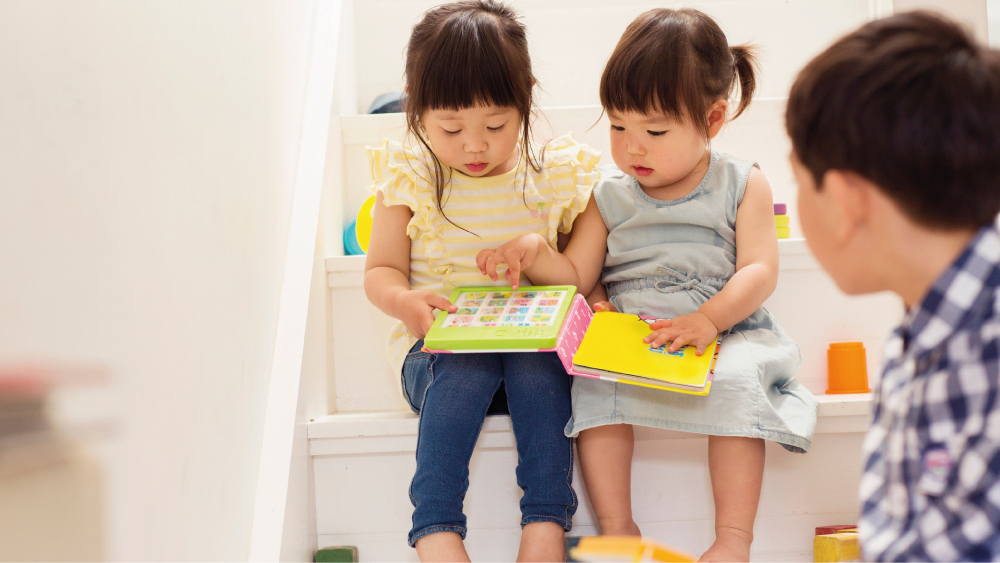
A well-mannered child, interacting beautifully with peers and elders is a sight every mum would love to see. As your child’s first teacher, you play a big role in the development of his social skills, and are in the best position to steer him towards healthy future social engagements, dispositions, and behaviour.
Self-control, empathy and effective communication are just some of the social skills that your toddler should develop to be prepared for school and beyond. Though it isn’t always easy to help your child practice these soft skills, remember that children who are able to regulate their emotions and interact well with others live happier and more successful livesi – and that’s always music to a mother’s ears!
Mums, here are four ways to hone your child's social skills.
1. Be an active partner in the learning process
While you may want your child to be the most well behaved kid in his class, he is going to pass through phases that you may find difficult to deal with! Mums with older kids may tell you about the ‘terrible twos and threes’, but what you need to keep in mind is that the understanding required to develop social skills comes gradually and with practice.
You’ll notice the progression. First he will do simple social acts like being comfortable with greeting people. Soon he would be holding conversations with you or even his toys! As he grows further, he will be able to engage in role play, express his views in a group, and empathise with others such as feeling happy when someone wins and sad when he sees someone cry then proceed to offer some comfort.
Be aware of these acts and encourage the good, while explaining the reasoning behind and correcting the bad. Let him know what is okay and what isn’t by pointing out his, other’s, and even your own behaviour. Teach him what is expected in specific situations like speaking softly when someone is trying to sleep, and loudly when he’s trying to be heard over ambient noise.
2. Patience and practice, patience and practice.
Learning by reiteration happens when you do something again and again, developing neuronal circuits. These are important to form long-term memory, which is important in building habits.
To help your child develop his social skills then, practice whenever you can. Teach him how to wait in a conversation. He needs to understand that it is a two-way process and he needs to pause and let the other person speak. As he grows up, teach him how to catch your attention respectfully, then initiate and carry a conversation. These social overtures are the building blocks of good interpersonal skills.
Another concept you can practice at home is that of personal space. Teaching your child to respect one’s space will dissuade him from reaching out and grabbing other children’s toys at whim.
Lastly, teach him empathy and collaboration. He needs to understand what others might be going through in order to work together. Simple illustrations like when he wants to play a running game with grandpa, explain that the elder’s body is not up to the task and encourage him to come up with a different activity to do together.
3. Increase exposure to peers
Kids learn faster when they see it in other children. Use this as an opportunity to engage their social skills. Let your toddler mingle with other toddlers and be fascinated by their learning mechanism. Toddlers often start out playing alongside other children, instead of with them - this is called parallel playii. Kids at this stage may play in the same area as others and mimic other children, but they won't necessarily interact with them immediately. This comes later on.
As your child grows older, you can expose him to more play dates, where he will learn to take part in interactions such as pretend playiii with other kids. This will in turn, strengthen his language, thinking, emotional, and social skills as well.
4. Don’t forget good nutrition
If you’re wondering whether nutrition has anything to do with EQ development, the answer is yes!
The brain continues to develop through early childhoodiv and needs vital nutrients to help its complex development.
References:
- Doward, J. (2014, November 08). Emotional health in childhood 'is the key to future happiness' Retrieved February 13, 2017, from https://www.theguardian.com/society/2014/nov/08/happiness-childhood-emot...
- Social Development. (n.d.). Retrieved February 14, 2017, from http://www.parents.com/toddlers-preschoolers/development/social/
- The Importance of Pretend Play. (n.d.). Retrieved February 14, 2017, from http://www.scholastic.com/parents/resources/article/creativity-play/impo...
- Kennedy et. al (2002). Basic principles of MRI and morphometry studies of human brain development. Developmental Science 5:3, pp 268-278.

